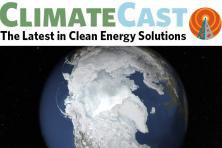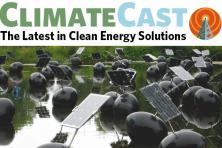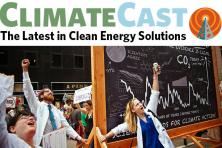Oregon Governor Brown makes climate action a top priority in new budget proposal
In Governor Kate Brown’s proposed Oregon budget for 2019-2021, climate action is listed among her top priorities, including strong support for 2019 passage of Clean Energy Jobs, a bill to limit and price carbon emitted by Oregon’s top polluters. The budget proposal includes the creation of a new Oregon Climate Authority to elevate and align state climate strategy, while the Oregon Department of Energy would be dissolved. She also released a paper outlining her climate action plan: "Oregon Climate Agenda: A Strong, Innovative, Inclusive Economy While Achieving State Climate Emissions Goals." In her budget address, Governor Brown stated that Oregon has “failed to fight climate change,” further noting that “with a strong economy, now is the time to reach to the state’s potential.”
The National Climate Assessment
The National Climate Assessment, a major report compiled by over 300 scientists representing 13 federal agencies, found that the earth's climate is now changing faster than at any point in the history of modern civilization, primarily because of human activities. It laid out rising climate-related threats to Americans' physical, social, and economic well being. The report warned that climate change will push millions of Americans away from the coast, and that the U.S. is not prepared to relocate millions of people and billions of dollars worth of coastal infrastructure. It also outlined the ways the U.S. will have to adapt to a warming world, from rebuilding and reinforcing infrastructure systems, to overhauling farming practices to protect against climate impacts like floods, wildfires and heat waves. It also detailed threats to global food security because of climate change.
It included region by region warnings, including the Pacific Northwest, where the report found that 2015 essentially provided us with a preview of what we can expect in the future. In 2015, high temperatures and low rainfall destroyed the state's snowpack, leading to widespread drought, wildfires and other impacts. It also outlined threats to U.S. Midwest agriculture production, which currently represents one of the “most major areas of agricultural production in the world and consistently affects the global economy.”
In an apparent effort to avoid a strong media response and public reaction, the report was released on the day after Thanksgiving rather than on the planned release date at a scientific conference in two weeks later. President Trump and a number of climate denying politicians and pundits then downplayed the report’s findings. Climate scientist Katharine Hayhoe set the record straight on Twitter, refuting false claims one by one.
Many ways to accelerate clean energy transportation
British Columbia has unveiled a plan to increase vehicle electrification throughout the province. If it becomes law, all new light-duty cars and trucks sold in B.C. must be electric or zero-emission by 2040. British Columbia is preparing for the change by expanding its charging network and creating additional financial incentives to encourage consumers to go electric. Back in the states, FedEx will add 1,000 electric delivery vans to its fleet in California as part of its effort to comply with new statewide emissions standards. Speaking of new emissions standards, Colorado has adopted its own rules that mirror California’s standard, which will reduce greenhouse gas emissions by an estimated 30 million tons through 2030. Colorado joins several other states in creating emissions standards as the federal government moves toward weakening nationwide mandates.
The transition is inevitable (but it could be happening faster)
A new public opinion poll found that eight in ten Americans, including two thirds of Republicans, understand that climate change is happening. This represents a major shift in public opinion from recent years. Fifty four percent of Americans now consider climate change to be a "very serious" problem.
This mindset shift is reflected in the newly elected U.S. Congress too: At least eighteen members-elect and members of Congress, led by Congresswoman-elect Alexandria Ocasio-Cortez, support a plan for a “Green New Deal,” beginning with creating a special congressional committee on climate change. Ocasio-Cortez and others also oppose Senator Joe Manchin’s appointment to become the top Democrat on the Senate Energy and Natural Resources Committee due to his staunch support for the coal industry, opposition to EPA regulatory authority, and donations from the fossil fuel industry. Senator Manchin received $156,240 from the fossil fuel industry in his 2018 re-election campaign, the industry he would be regulating if appointed to the committee.
According to the energy researchers Carbon Tracker, about 42 percent of the world’s coal generation capacity is losing money, a number that is expected to rise to 56 percent by 2030. Despite this, demand for coal rose in 2017, with China and India burning more than any other countries.
International Commitments
The annual UN climate summit is currently underway in Katowice, Poland, with scientists providing sober assessments of potential climate catastrophe and the needed cuts in carbon emissions and rise in protection from extreme weather. This year’s talks have been described as the most critical since the Paris talks in 2015, and the World Bank has announced $200 billion in funding over five years to support countries taking action against climate change. At a recent G20 meeting, 19 of 20 countries agreed to continue to do their part to uphold the Paris Climate Accord. The United States was the only country who didn’t sign the agreement.
Climate impacts: Closing fisheries and flooding homes
The future of the National Flood Insurance Program is in jeopardy. Due for reauthorization in November, Congress approved a seven-day extension of the program through December 7th -- the deadline for Congress to agree on a government funding plan and avoid a shutdown. The program was $20 billion in the red before the start of hurricane season, and FEMA records show that nearly 37,000 U.S. properties have repeatedly flooded and been rebuilt with funds from this program.
Maine’s winter shrimp season has been officially closed for another three years, reflecting concern that the area may never bounce back following years of rising ocean temperatures that have damaged the health and stability of the shrimp population. The winter season has already been closed in Maine, New Hampshire and Massachusetts since 2013. Climate change is also hurting cod fisheries; a new study finds that Atlantic cod numbers will decline as much as 60 percent if temperatures warm more than 3 degrees Celsius above pre-industrial times.
In brief: Inspiring confidence in the clean energy transition
At Climate Solutions 20th Anniversary event in Portland, Hal Harvey, CEO of Energy Innovation and co-author of a new book entitled Designing Climate Solutions, discussed how to achieve what he calls the Four Zeroes—the four major carbon-emitting sectors we need to address to reduce emissions to stable levels: 1) a zero-carbon grid; 2) zero-emission vehicles; 3) zero-net energy buildings; 4) zero-waste manufacturing.





